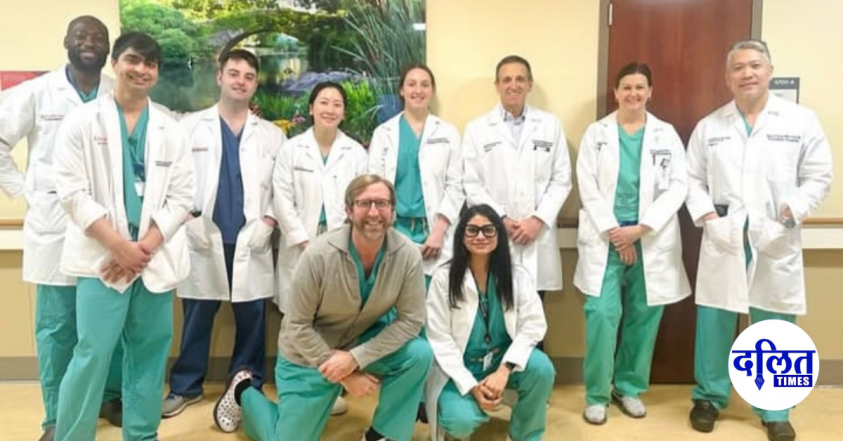“When the victors rewrite history, it’s just another kind of war, waged after the battlefield killing is done to murder the memory of the defeated.”- Monali Maheda wrote in her facebook profile.
Monali Mahedia is a trailblazing Indian doctor who has made history as the first Dalit woman to secure admission into an integrated plastic surgery residency program in the United States. A graduate of B.J. Medical College, Ahmedabad, Dr. Monali Mahedia pursued her medical training with exceptional dedication, later advancing her career through the Department of Surgery at Rutgers New Jersey Medical School. She is currently based in Brooklyn, New York, where she is training in one of the most competitive and prestigious fields in medicine—plastic and reconstructive surgery.
Also Read: Glamour Isn’t Enough: The Fight for Respectful and Drug-Free Workspaces in Cinema
As a first-generation doctor from a historically marginalized community, Dr. Monali Mahedia’s journey represents a monumental achievement in both medicine and social justice. Her path breaks entrenched barriers of caste, gender, and class, and her work reflects a commitment not only to healing the body but also to challenging the systemic inequities that pervade global healthcare and academia.
Deeply aware of the socio-political significance of her identity, Dr.Monali Mahedia uses her platform to advocate for representation, equity, and the empowerment of marginalized voices in medicine. Her story is a testament to resilience, courage, and the unrelenting pursuit of justice through excellence.
In the vast corridors of American medicine—where caste is unnamed but power is palpable—a Dalit woman has carved out history. Not in stone, but in flesh and bone, in scalpel and suture. Dr. Monali Mahedia’s name now stands etched in time, not just as a surgeon, but as a signal fire for a new future.
From Gujarat to Brooklyn, from the dust of caste-marked institutions to the steel sterility of U.S. operating theatres, Dr.Monali Mahedia’s journey is not just personal—it is political.

Plastic surgery, despite how it’s popularly portrayed, is not merely cosmetic. It is the art of rebuilding the broken, healing the disfigured, restoring form after trauma and violence. What does it mean, then, that a Dalit woman—born in a society that has long disfigured and dismembered her people, symbolically and literally—is now in a position to restore, reconstruct, and reimagine?
Monali’s footsteps echo through the halls of Rutgers NJMS and Brooklyn’s Department of Surgery—institutions that might see her as a checkbox ticked. A “diversity win.” But what they cannot see is the generational weight she carries: the silenced aspirations of ancestors denied education, healthcare, dignity. This is not an individual success. It is intergenerational justice—won through grit, not charity.
Dr. Mahedia refuses to let the victors rewrite her story. She writes back—with the precision of a surgeon and the defiance of a survivor. In a field dominated by Savarna men in India and white men in the U.S., her presence is not just achievement. It is an intervention.
Let us not forget: this is Gujarat—the land where Dalit children have been lynched for wearing shoes, for daring to ride horses, for drinking from the wrong well. The land where Rohith Vemula was driven to death for dreaming of science, equality, and dignity. And from that same ground, a Dalit woman has risen—not just to practice medicine, but to enter one of its most elite and exclusionary realms.
Also Read: The Demand for a Caste Census in Telangana: A Social and Political Imperative
This is not a story of meritocracy. It is a story of resistance. In a country where Dalit women are often reduced to case numbers, to headlines of violence, or to tropes of “resilience,” Monali Mahedia’s journey says something sharper: Dalit women are not here to be saved. We are here to save.
Let us be clear: her success is not despite her caste identity, but in defiance of the structures that tried to erase it. She claims space in the most literal sense—in operating rooms, in academic journals, in professional circles—and turns that occupation into testimony.
Her story whispers to every Dalit girl studying under a flickering light, every first-generation student navigating systems never built for them: Yes, it is possible. Not easy. Never easy. But possible. The scalpel in Dr. Monali Mahedia’s hand is more than a tool of medicine. It is a weapon against caste.
Write By Bindu Ammini



